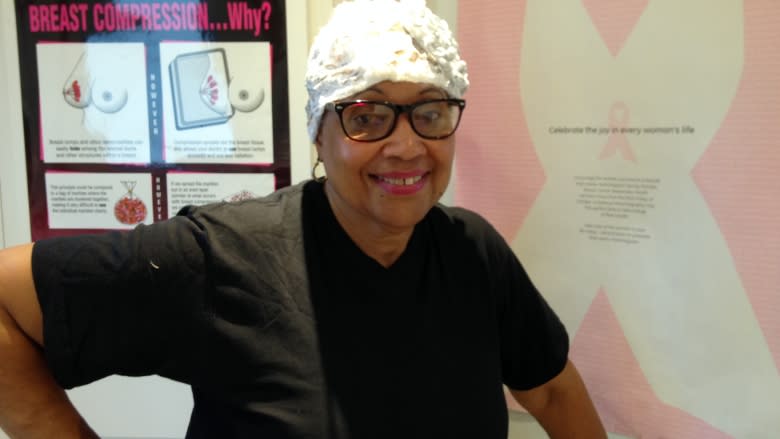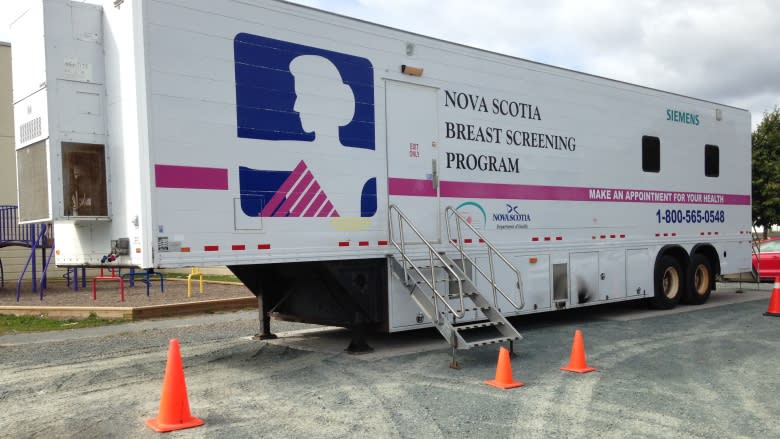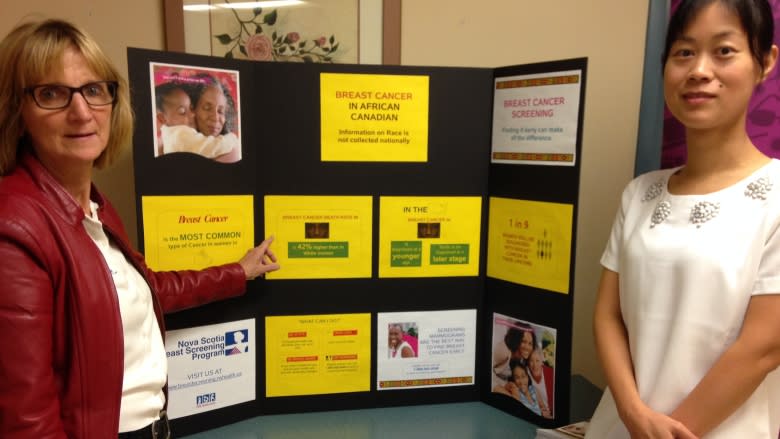North Preston mobile breast-screening clinic helps catch cancer earlier
For 20 years, a mobile breast-screening program has helped diagnose women in rural Halifax.
Viola Cain faithfully visits the Nova Scotia Breast Screening Program mobile van once a year when it arrives in North Preston because one of her sisters has the disease.
Cain said it's beneficial to have the van come to their community, especially for people who cannot get to downtown Dartmouth for screening.
"This van is here and it's very helpful, very meaningful and everybody should take advantage of it," Cain said.
For two days this week — Thursday and Friday — the oversized fifth-wheel van is parked outside the North Preston Community Centre right across from the St. Thomas Baptist Church on Simmonds Road, one of community's busiest streets.
The target group is women between the ages of 40 and 69.
By Thursday afternoon, 52 women from the area had signed up for the 78 available spots.
How the program works
Upon arrival, an X-ray technologist greets each woman, registers her and takes a brief medical history to record any new complaints.
The woman is then taken into a private room to have a mammogram done.
Four pictures are taken, at least two for each breast. Both the patient and her family doctor receive the test results.
"The big important part of the whole procedure is to return — one mammogram is not enough," said Theresa Foley, program manager for the Nova Scotia Breast Screening Program.
"What the radiologists look for are small changes in a mammogram and it's through regular screening that those are picked up."
Often women don't experience symptoms early on
Shauna Crawley-Jordan is a registered nurse at the Community Health and Wellness Centre in North Preston.
At the centre many women with early breast cancer have no symptoms, she says.
"So that's what makes this mobile breast screening van so crucial," said Crawley-Jordan.
"We're finding with the black community — at least with black women — that they're finding breast cancer at younger ages and in more advanced forms.... Black women are twice as likely to develop what's called a triple-negative breast cancer, which is a really aggressive form of the disease," she said.
"And it has everything to do with the higher-density breast tissue [in black women] which makes both interpreting and reading the results difficult because a small cancer can be concealed in dense breast tissue."
The mobile van was started in 1994 to reach rural and remote parts of Nova Scotia for people that had difficulties making it into regular sites.
More information on patient ethnicity needed
The prevalence of breast cancer among black women is not known because no statistics are collected on a person's race or ethnicity.
"It's not captured on a federal level, nor is it captured at the provincial level," said Olivia Tong, the breast-screening program's project co-ordinator and data analyst.
"It would be very beneficial if we had that information because that will show us is there a disparity in breast screening rates in comparison to Nova Scotia as a whole and then compare that to African Nova Scotians, or even compare it to First Nations women in Nova Scotia," Tong said.
"Without race information, we simply cannot capture that information."
However, according to the American Cancer Society's latest publication, Breast Cancer Facts and Figures 2015-2016, the average-age black women are diagnosed is 58 years old, compared to white women at age 62.
That report also says black women have a survival rate of 81 per cent compared to 92 per cent for white women when looking at a five-year survival rate after a woman is diagnosed with breast cancer.
New brochure 'more culturally appropriate'
As part of its outreach to the black community, with input from people in North Preston, the breast screening program has designed a colourful new brochure that shows a black mammogram technologist screening a black patient.
"We were told that they would like to see a brochure that is more culturally appropriate so we asked for a colour scheme or images that would appeal to the community," Tong said.
"From what we heard from the community as well, they don't like to see images that don't reflect their community members, so we picked that image."
The brochure will be sent to physicians across Nova Scotia.




